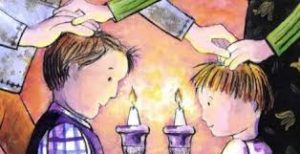 In Parashat Va-Yehi, this week’s final parashah of the book of Bereishit, Jacob blesses his sons before he dies. Among his words is the formula we use today to bless our own children:
In Parashat Va-Yehi, this week’s final parashah of the book of Bereishit, Jacob blesses his sons before he dies. Among his words is the formula we use today to bless our own children:
So he blessed them that day saying, “May God make you like Ephraim and like Menashe.”
In the Bible, we see the parental blessing as a valuable heritage bequeathed to the next generation, even a determinant of the child’s destiny going forward, and much significance is attributed to the words of the blessings and the order in which the children receive them. The parents seem to possess a certain power or authority over the well-being of their children going forward. In the Talmud, the rabbis taught “Scripture ranks the cursing of father and mother with the cursing of God” (Ḳid. 30b), implying that in relation to their children parents have comparable power and influence as the All Mighty has over His creations.
Do you bless your children? In what context do you bless them? What is your intention in blessing them? Is offering a blessing to another a way of showing gratitude for the miracles we have been given in our own lives?
When we bless our children, whether it is every Friday night before Kiddush or before a milestone event like a Bar Mitzvah or a wedding, whether we use traditional words from our liturgy or our own words from the heart, we are taking a moment to acknowledge the awesome responsibility we have in raising and shaping the life of another human being.
Read the article below to think about how the simple act of blessing our children can redefine for ourselves how we view the drudgery that often accompanies day-to-day parenting.
Shabbat Shalom.












